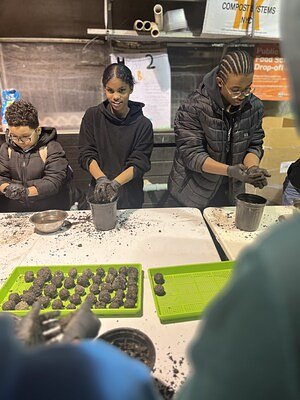
Harlem Nonprofit Cultivates Community Resilience with City-Wide Composting Network
The Brotherhood Sister Sol receives funding to expand its innovative composting program, empowering NYC neighborhoods & tackling environmental injustice through local action.
Harlem Nonprofit Cultivates Community Resilience with City-Wide Composting Network
NEW YORK, NY – November 22, 2025
From Harlem Roots to City-Wide Impact
The Brotherhood Sister Sol (BroSis), a Harlem-based organization dedicated to youth development and community empowerment, is expanding its reach with a city-wide initiative focused on community composting. A recent $283,333 grant from the NYC Council’s ‘Empowering Black Communities’ initiative will fuel the establishment of a network of 1,000 composting sites across the five boroughs, offering a model for environmentally-driven community resilience. For over 30 years, BroSis has been a pillar of Harlem, and now, with this expansion, they aim to bring their community-focused approach to neighborhoods across the city.
A Response to Environmental Injustice
This initiative isn’t simply about reducing landfill waste; it's a direct response to systemic environmental injustices that disproportionately affect Black and Brown communities in New York City. Historically, these neighborhoods have borne the brunt of pollution and lacked access to green spaces. “For too long, our communities have been treated as dumping grounds,” said a community organizer involved in the project. “This isn’t just about composting; it’s about reclaiming our spaces and building a healthier future.”
BroSis’s approach is rooted in the belief that local communities are best equipped to address their own challenges. By empowering residents to manage their organic waste and create nutrient-rich soil, the program fosters self-sufficiency, promotes food security, and strengthens community bonds. The organization’s commitment extends beyond infrastructure; they are dedicated to education and training, equipping community members with the knowledge and skills needed to sustain the composting network long-term.
Innovative Technology & Scalable Solutions
The project’s ambitious goal of 1,000 composting sites is made possible through the implementation of a patented ‘Hotbox Composting System.’ Developed with input from BroSis staff, this technology accelerates the decomposition process, significantly reducing the time and space required for traditional composting methods. Unlike conventional methods, the Hotbox system can efficiently handle a large volume of organic waste in urban environments, making it ideal for densely populated neighborhoods.
The speed and efficiency of this system are critical, allowing for quicker turnaround of compost for local gardens, green spaces, and urban farms. “We needed a solution that could scale and address the specific challenges of urban composting,” explained a lead researcher involved in evaluating the technology. “The Hotbox system offers a viable solution for effectively processing organic waste in a limited space.”
A City Invested in Community-Led Environmentalism
The NYC Council’s ‘Empowering Black Communities’ initiative underscores the growing recognition of the vital role community-led organizations play in addressing environmental challenges. The funding for BroSis’s composting program represents a significant investment in sustainable infrastructure and environmental justice. The total city investment now stands at $583,333, supporting over 50 community composting sites across New York City.
However, the path hasn’t been without obstacles. In recent years, community composting programs faced potential budget cuts, threatening their very existence. A coalition of environmental organizations and community advocates successfully rallied support, leading to the restoration of funding and solidifying the city’s commitment to community-led environmental initiatives. “It was a wake-up call,” said a representative from a local environmental group. “We realized we needed to fight for what we believe in and demonstrate the value of these programs.”
The future of composting in New York City hinges on collaboration, investment, and a shared commitment to environmental justice. BroSis’s initiative, coupled with the city’s growing support, offers a model for building a more sustainable, equitable, and resilient future for all New Yorkers. The organization plans to focus on neighborhood empowerment, providing training and resources to ensure the long-term success of the composting network and fostering a culture of environmental stewardship within the communities it serves.
